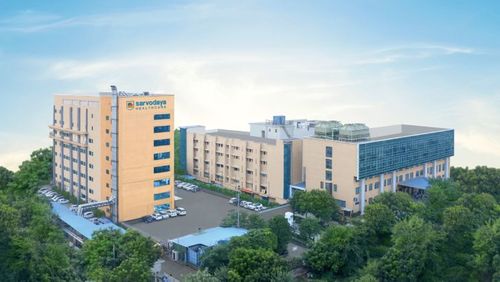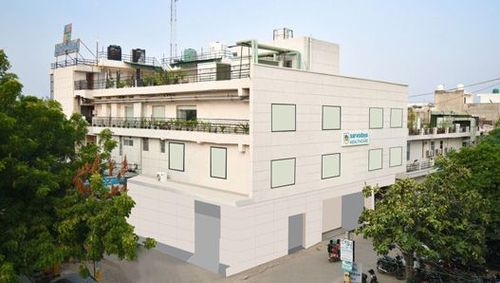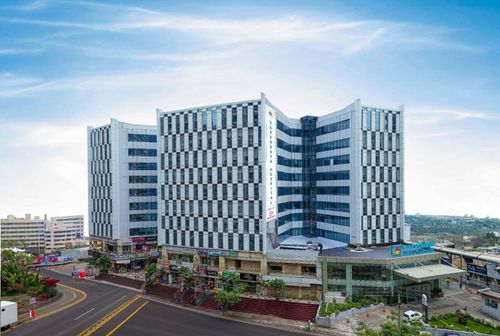Overview
Migraines are more than “bad headaches.” They can cause throbbing head pain, nausea, sensitivity to light/sound, and may last for hours or days, disrupting work and daily life.
At Sarvodaya, an experienced neurology team offers comprehensive care: accurate diagnosis, trigger management, and modern treatments to reduce attack frequency and intensity.
Plans combine evidence‑based medicines, lifestyle strategies, and device‑based options when appropriate, so relief is faster and long‑term control is realistic. As a leading neurology hospital in Delhi NCR, we ensure patients receive holistic migraine care tailored to their needs.
Symptoms of Migraine
- Throbbing or pulsating headache, often one-sided
- Pain worsens with routine physical activity
- Nausea and vomiting
- Sensitivity to light, sound, or smell
- Visual aura (flashing lights, zig-zag lines) in some cases
- Prolonged or frequent attacks
- New or unusual neurological symptoms needing prompt evaluation
Causes of Migraine
- Genetic predisposition and brain excitability
- Stress and irregular sleep patterns
- Dehydration and skipped meals
- Strong odours and weather changes
- Hormonal fluctuations
- Certain foods and drinks
- Medication overuse headaches
Diagnosis of Migraine Headaches
Accurate diagnosis is crucial for effective management and preventing long-term complications. At a trusted neurology hospital, our experienced neurologists use advanced evaluation methods to classify migraine types and design personalised treatment plans.
- Assessment of clinical history – A thorough assessment of symptoms helps identify the migraine type, including with or without aura, chronic versus episodic, and related lifestyle influences.
- Neurological examination – Neurologists evaluate reflexes, muscle strength, coordination, and sensory response to rule out other neurological conditions and confirm migraine diagnosis with precision.
- Headache diary – Patients track frequency, severity, triggers, and lifestyle factors in a structured diary, helping doctors personalise management strategies and monitor treatment effectiveness over time.
- Imaging tests (MRI/CT scan) – Scans are recommended only when red flags exist, such as new, progressive headaches, neurological deficits, fever, or suspected secondary neurological conditions.
- Blood tests – Conducted to identify systemic conditions, infections, hormonal imbalances, or autoimmune disorders when secondary causes of headache are suspected beyond primary migraine pathology.
Treatment of Migraine
- Acute (abortive) therapy: Medications such as NSAIDs, triptans, gepants and anti-nausea agents help stop migraine attacks if taken early. Timely treatment significantly improves pain relief and functional recovery.
- Preventive therapy: For frequent or disabling migraines, neurologists may prescribe beta-blockers, monoclonal antibodies, or Botox. Preventive care is tailored to individual needs for long-term relief.
- Non-drug therapies: Complementary options like neuromodulation devices, relaxation and breathing techniques, Cognitive Behavioural Therapy (CBT), along with sleep and nutrition guidance, support patients in managing migraine symptoms holistically.
- Trigger control: Lifestyle measures such as staying hydrated, maintaining regular meals, moderating caffeine, correcting ergonomics, and practising stress management can reduce migraine frequency and enhance quality of life.
Prevention & Lifestyle Modification
- Identify & avoid triggers: Keep a headache diary to track food, sleep patterns, stress levels, or environmental factors that may be contributing to migraine attacks.
- Maintain a healthy lifestyle: A balanced diet rich in fruits, vegetables, and whole grains, along with regular exercise, supports both brain and body health.
- Stay hydrated & follow proper sleep routines: Adequate water intake and consistent sleep help regulate brain activity and prevent migraine flare-ups.
- Quit smoking & limit alcohol consumption: These habits can worsen neurological health and act as potential migraine triggers. Reducing or eliminating them lowers risks.
- Stress management & mental wellness: Practices such as meditation, yoga, and mindfulness can reduce stress, one of the most common causes of migraine and tension headaches.
- Routine health check-ups: Regular neurological evaluations ensure early detection of underlying conditions and help tailor effective treatment strategies.
Pre–Post Care and Lifestyle
Pre-Treatment Guidelines
- Keep a 4–6 week headache diary, noting timing, triggers, and medicines taken
- Optimise sleep, hydration, and meal timing; begin light aerobic activity as tolerated
- Review current painkiller use to avoid medication-overuse headache
- Consult a neurology hospital in Delhi for a structured evaluation and baseline care plan
- Follow a step-wise plan for acute and preventive therapy with regular reviews
- Maintain a work and travel strategy: rescue kit, hydration/snack routine, screen-time breaks, and use of blue-light filters.
- Undergo periodic re-assessment to taper or adjust preventive .medicines when stable.
- Seek timely support from migraine headache doctors near you to ensure long-term relief and quality of life.
Our Specialist here:












